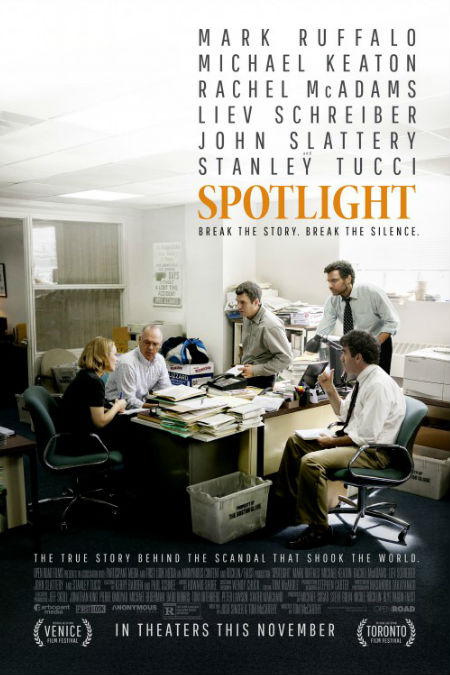
Humanity has a natural predilection for justice.
It’s why so much of our storytelling pivots around the idea that justice is not only possible, through fair means or foul, but desirable, that the idea of someone or something such as an institution getting away with something is unacceptable and must be countered where possible.
But as director Tom McCarthy’s autobiographical drama Spotlight shows only too clearly, achieving a just outcome, particularly one on a societal level, can be a titanic struggle indeed.
Titanic because though all of us subscribe in one form or another to justice and its notions of fairness and equality and payment for wrongs wrought, in real life far more selfish concerns can trump a just resolution.
In this case, the forces arrayed against include the Catholic Archdioceses of Boston and Archbishop Law (Len Cariou), some profiteering elements of the legal profession, the police and the media who colluded actively, and by omission, to cover up recurrent pedophiliac actions by a frighteningly large number of priests, numbering close to 90.
You would think that it would be impossible for that many people engaged in morally-repugnant criminal activity to get away with it for as long as they did, particularly given the more courageous parents among the parishioners who stood up and asked to be counted on behalf of their abused children, but they succeeded because so many people looked the other way.
And if it were not for the tenacious actions of The Boston Globe’s Spotlight team, an investigative journalist unit who had broken a succession of major stories since the 1960s, who sought out the truth in the face of strenuous efforts to keep it hidden, this establishment-heavy coalition would have continued to ignore the flagrant abuse effectively occurring in plain sight.
But beginning with an extended period of investigation in 2001, and a groundbreaking article in 2002, whose publications marks the dramatic end of the movie but not the subsequent reporting which ended up numbering in excess of 600 pieces on what became a worldwide scandal, the Spotlight team, consisting of Walter “Robby” Robinson (Michael Keaton), Michael Rezendes (Mark Ruffalo), Sacha Pfeiffer (Rachel McAdams) and Matt Carroll (Brian d’Arcy James), aided by editors Marty Baron (Liev Schreiber) and Ben Bradlee Jr. (John Slattery), shook the very foundations of Boston.
It was momentous work with game-changing implications that redefined how an entire city, one very closely identified with the Catholic Church, dealt with its major institutions but it also had a profound effect that rippled worldwide with many religious and secular organisations suddenly finding that what happens in the dark cannot stay hidden if good men and women decide to do something.
What distinguishes Spotlight is that it doesn’t attempt to sensationalise these events.
Both Tom McCarthy, and Josh Singer with whom he wrote the finely-nuanced screenplay, and an array of fine actors who turn in exemplarily understated but powerful performances, are sage enough to realise that this story is epic enough to tell itself without any manipulative narrative bells and whistles.
Much of the film’s running time is devoted to the hard work done by the team of four reporters, who expanded to eight as the investigation continued in 2002, who chased leads left, right and centre, who faced off with lawyers, clergy and a city bureaucracy, all conspiring to keep the truth hidden and justice for the victims denied.
There is no attempt at any stage of the film to artificially play up the drama, no scenes that scream “This is Important Damnit! Pay Attention!” and no grandstanding moments save for the time that an exhausted Rezendes, whose marriage hangs in the balance thanks to his prioritising of reporting over the rest of his life, demands that Robinson publish immediately or be damned by the consequences.
By eschewing a sensationalist angle, Spotlight allows this impressive tale of the Fourth Estate staring down the powers-that-be to be revealed piece by dogged piece until the Catholic Church and those that had aided and abetted them stood exposed to the winds of well-justified public opprobrium.
This is not to say that it implies that everything is better after the articles are published.
While the scandal is brought to light, and prosecutions are made, anyone who has followed events since understands that full, unrestricted justice has not been brought to bear on powerful institutions like the church and that there is still some way to go until society is purged, if it can ever be purged, of the evil that was allowed to flourish in the open in powerful organisations throughout Boston and the world for so long.
Even so without the actions of people like the Spotlight team, justice, even its often-compromised real world form, would never have been achieved for a legion of people, and it is this alone that warrants the telling of this remarkable story.